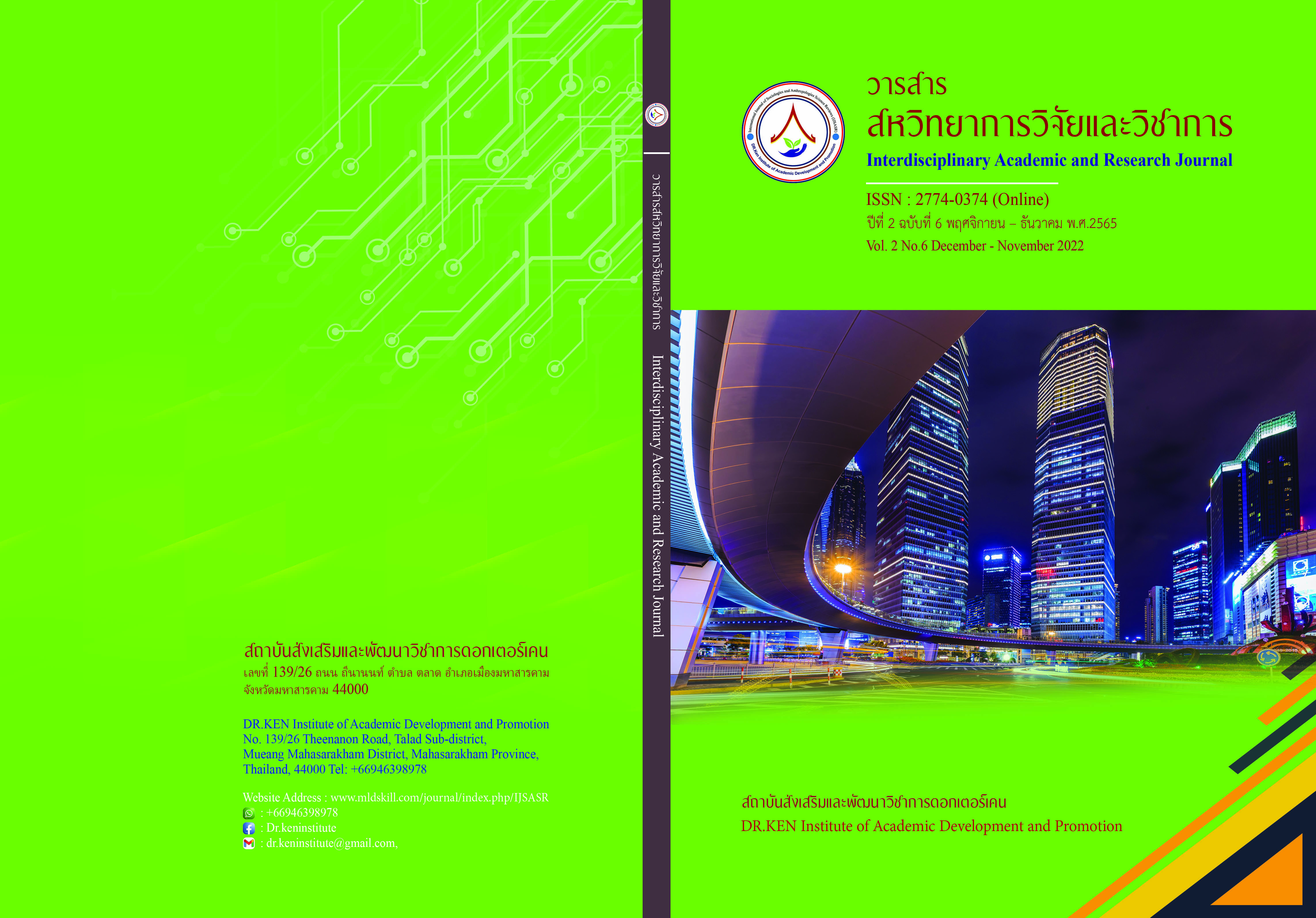The Learning Organization Development Guidelines of School Administrators Under Primary Education Service Area Office 1
DOI:
https://doi.org/10.14456/iarj.2022.133Keywords:
Learning Organization; , School Administrators; , Development GuidelinesAbstract
A learning organization is an organization that works productively along with learning and gaining experience and creates knowledge to work, develop methods, and systems, and work together to create a learning organization that requires human cost as the creator of quality. The management of the educational institution has resulted in the development of an efficient organization where personnel can learn and develop in all dimensions. Thus, the purposes of this research were 1) to study the current condition, desirable condition, and the principal needs of the Learning Organization of school administrators. 2) to study the Learning Organization guidelines of school administrators, the study was divided into 2 phases. Phase 1: studied the current condition, desirable condition, and the principal needs of the Learning Organization of school administrators by stratified random sampling method from the 320 school administrators and teachers as the group of samples. The research tool was a questionnaire, the consensus index was 0.80–1.00, the desirable condition was between 0.31-0.80, and the confidence was 0.97. Phase 2: to study the achievement Learning Organization guidelines of school administrators from 9 experts with a tool: the interview form. Data were analyzed by descriptive analysis. The results showed that (1) the present condition and the desirable condition of the learning organization of the educational institutions as a whole and in each aspect were at the moderate and the highest levels respectively School learning from PNI is team learning. being a well-rounded person having a common vision a conceptual plan and systematic thinking, respectively. (2) Guidelines for developing learning organizations of educational institutions Found 22 guidelines for developing a learning organization and the results of assessing the feasibility and appropriateness of the learning organization development guidelines of educational institutions. at the highest level.
References
กระทรวงศึกษาธิการ. (2542).พระราชบัญญัติการศึกษาแห่งชาติ พ.ศ.2542. กรุงเทพฯ : องค์การค้าของคุรุสภา.
กระทรวงศึกษาธิการ. (2557).นโยบายสำนักงานคณะกรรมการการศึกษาขั้นพื้นฐาน. กรุงเทพฯ : องค์การค้าคุรุสภา.
กัญญารัตน์ สะวิสัย (2557). พฤติกรรมการบริหารองค์การแห่งการเรียนรู้ของผู้บริหารสถานศึกษา สังกัดสำนักงานเขตพื้นที่การศึกษาประถมศึกษาหนองคาย เขต 2. วิทยานิพนธ์ครุศาสตรมหาบัณฑิต สาขาวิชาการบริหารการศึกษา บัณฑิตวิทยาลัย มหาวิทยาลัยราชภัฏมหาสารคาม.
จิรัชฌา วิเชียรปัญญา. (2557). การจัดการเนื้อหาสินทรัพย์ดิจิทัล: ความท้าทายขององค์กรในยุคเศรษฐกิจฐานความรู้. รังสิตสารสนเทศ, 20 (2), 96-110.
นภาพร หัสไทรทอง. (2562). แนวทางการพัฒนาองค์การแห่งการเรียนรู้ของสำนักงานปลัดกระทรวงศึกษาธิการ. มหาวิทยาลัยราชภัฏนครปฐม.
บุญชม ศรีสะอาด. (2554). หลักการวิจัยเบื้องต้น. พิมพ์ครั้งที่ 9. สุวิริยาสาส์น.
บุญชม ศรีสะอาด. (2556). วิธีการทางสถิติสำหรับการวิจัย เล่ม 1. พิมพ์ครั้งที่ 5. วีริยาสาส์น.
ไพลิน บุญนา (2559).ลักษณะความเป็นองค์การแห่งการเรียนรู้ในสถานศึกษา สังกัดสำนักงานเขตพื้นที่การศึกษาประถมศึกษาจันทบุรี. วิทยานิพนธ์ครุศาสตรมหาบัณฑิต สาขาวิชาการบริหารการศึกษา บัณฑิตวิทยาลัย มหาวิทยาลัยราชภัฏราไพพรรณี.
มาร์ควอดต์,ไมเคิล เจ. (2549).การพัฒนาองค์การแห่งการเรียนรู้.แปลจาก Building the learning organization : mastering the 5 elements for corporate learning. โดย บดินท์ วิจารณ์. กรุงเทพฯ : เอ็กซเปอร์เน็ท.
รวมพร ทองรัศมี และคณะ. (2557). รูปแบบการบริหารจัดการเพื่อการเป็นองค์การแห่งการเรียนรู้ของมหาวิทยาลัยเซาธ์อีสท์บางกอก. วารสารวิชาการมหาวิทยาลัยราชภัฏเชียงราย, 9 (3), 169-179.
วิจารณ์ พานิช. (2550). วิถีแห่งองค์กรอัจฉริยะ.จุลสารอุตสาหกรรมสัมพันธ์. 73. 2-3.
ศักดิ์สิน โรจน์สราญรมย์. (2554). การบริหารเพื่อการเรียนรู่. กรุงเทพ : พัฒนาคุณภาพวิชาการ.
สำนักงานคณะกรรมการการศึกษาขั้นพื้นฐาน. (2546). คู่มือการปฏิบัติงานสำนักงานเขตพื้นที่การศึกษา. กรุงเทพฯ : โรงพิมพ์องค์การรับส่งสินค้าและพัสดุ.
สุวิมล ว่องวาณิช. (2558). การวิจัยประเมินความต้องการจำเป็น. พิมพ์ครั้งที่ 3. กรุงเทพฯ: สำนักพิมพ์แห่งจุฬาลงกรณ์มหาวิทยาลัย.
Krejcie, R.V. and Morgan, D.W., (1970). Determining Sample Size for Research Activities. Educational and Psychological Measurement, 30, 607-610.
Marquardt, M. J. & Reynolds, A. (1994). The Global Learning Organization. New York: IRWIN.
Senge, M. (1990). The Fifth Discipline: The art and practice of the learning organization. New York: Doubleday.
Senge, M. (2006). The fifth discipline: The art and practice of the learning organization. 2nd edition, London: Random House Business.
Downloads
Published
How to Cite
Issue
Section
License
Copyright (c) 2022 ชานันท์ ข่าขันมะลี, จำเนียร พลหาญ

This work is licensed under a Creative Commons Attribution-NonCommercial-NoDerivatives 4.0 International License.
Copyright on any article in the Interdisciplinary Academic and Research Journal is retained by the author(s) under the under the Creative Commons Attribution-NonCommercial-NoDerivatives 4.0 International License. Permission to use text, content, images, etc. of publication. Any user to read, download, copy, distribute, print, search, or link to the full texts of articles, crawl them for indexing, pass them as data to software, or use them for any other lawful purpose. But do not use it for commercial use or with the intent to benefit any business.
















.png)


